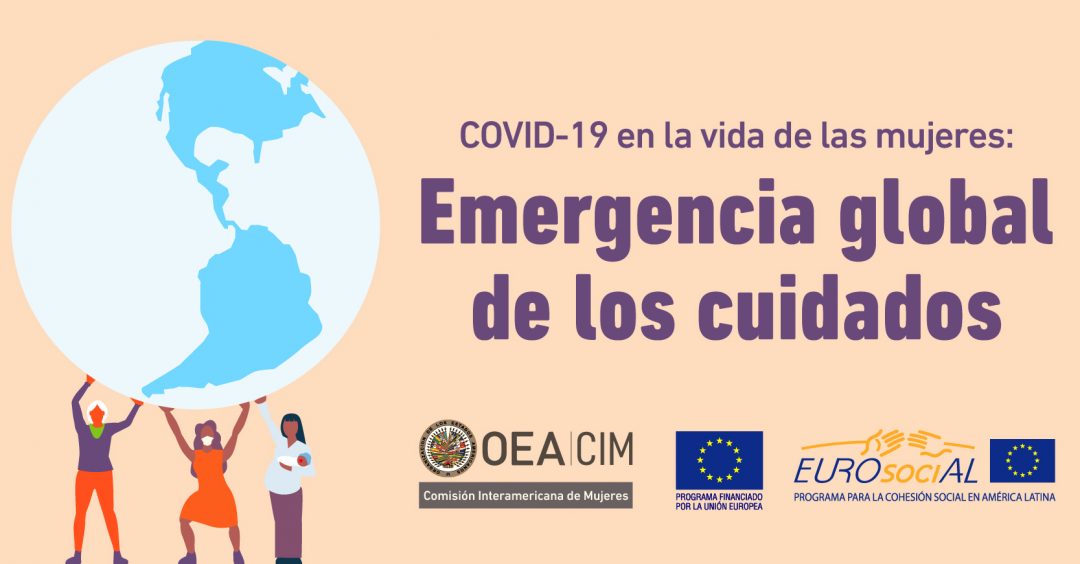The EU EUROsociAL+ Programme, through its Gender Equality and Social Policy areas, has worked in association with the Organization of American States's Inter-American Commission of Women to highlight the role of women during the pandemic in the prevalence and importance of care, new patterns, emergency data and lessons learnt from Europe.

The EUROsociAL+ European Union Programme and the OAS’s Inter-American Commission of Women have presented and made available to the Latin American countries participating in EUROsociAL, OAS Member States, civil society organisations and the private sector, the document “Covid-19 in women’s lives:The global care emergency”, in response to the deepening inequality in the distribution of domestic and care tasks and the increase in the unpaid workload that is being undertaken by women. The paper analyses the role of women in the functioning of domestic and productive life and the impacts thereof on their lives and on the economy.
The document focuses on the prevalence and importance of care, new patterns, emergency data, and lessons learnt from Europe. It specifically seeks to ensure that the aforementioned risks can be converted into opportunities if governments develop strategies around five points: 1) the right of people to be cared for, 2) support to families from social protection systems, 3) the participation of men in care duties, 4) the operation of value chains that link up with the productive sector and 5) care as a cross-cutting priority.
As a result of Covid-19, the world is facing a health, social and economic quarantine, the scope and duration of which are still uncertain, which has left us in no doubt that women are the caregivers both inside and outside the home. Care already meant there was a disparity in the use of women’s time, which is exacerbated by the closure of schools, social isolation, the care needs of sick people, working from home and the new needs of the elderly. Faced with the arrival of Covid-19 and, with the support of the EUROsociAL+ Programme through its areas of Social Policies and Gender Equality, the OAS’s Inter-American Commission of Women has identified the deepening of existing gender inequalities and warned of the risk of backsliding with regard to women’s rights.
The Commission and EUROsociAL+ have highlighted the negative effects on women’s lives and on societies of the lack of the equitable distribution of domestic and care work. This document makes it clear that time as far as women are concerned has reached a point of maximum flexibility as a result the increase in their workload, both paid and unpaid. The presence of physical exhaustion and adverse effects on mental health such as stress, anxiety and depression are also reported, which puts their jobs or permanence in the labour market at risk.
“Covid-19 has questioned the resilience of our societies, it has had a more serious impact on people who were already vulnerable. It has dealt a major blow to the advancement of women’s rights, both in Europe and in Latin America. The response to the pandemic must take place in a multilateral spirit, in cooperation with strategic allies. The European Union is therefore pleased to be able to collaborate with the OAS’s Inter-American Commission of Women through its EUROsociAL+ programme. We are encouraged by the firm commitment that exists to address the differentiated needs of women in this pandemic, particularly in terms of economic empowerment and co-responsibility. It is crucial that the care agenda is at the centre of public policies and recovery plans, both in Europe and in the American region. It will contribute to rebuilding a more just, resilient and sustainable world, leaving no one behind”, said the Latin America and the Caribbean Director on the European Commission’s Directorate General for International Cooperation and Development, Jolita Butkeviciene.
“Facing the health, economic and social crisis which the region is experiencing requires tackling and declaring a global care emergency. The Inter-American Commission of Women has made this document available to Member States as a strategic and practical tool for the taking of measures, emphasising that care involves all areas of life, both family and economic. We cannot continue to allow this silent inequality that mainly affects women”, said OAS Secretary General Luis Almagro.
“Through this document, the Inter-American Commission of Women is making the invisible visible: it is women, through their unpaid work, who sustain the world economy. When we assign women the primary responsibility for domestic and care work, we are immediately limiting their entry to or continuation in the labour market. We cannot permit the loss of half the population’s human talent. It is essential to take measures and design immediate public policies in social, economic and co-responsibility matters”, said the Executive Secretary of the Inter-American Commission of Women, Alejandra Mora Mora.
The document prepared by the OAS’s Inter-American Commission of Women with the support of the EU through EUROsociAL+ allows us to better understand the care emergency as a collective problem, the responses to which must also be collective, with social co-responsibility both inside and outside the home involving men, the State and private-sector companies. It concludes by offering a series of specific recommendations to tackle the multidimensional crisis that is affecting health, the economy, social life and politics,
placing special emphasis on the economic empowerment of women as an individual right and as a central part of the sustainable economic growth of countries during the post-Covid-19 recovery stage.



